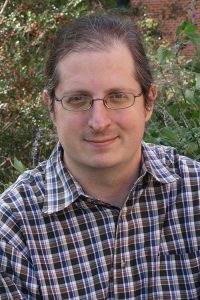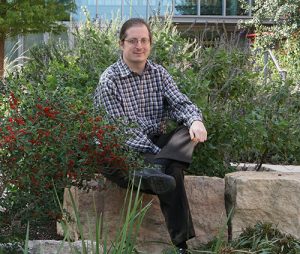 Rice University computer science alumnus Seth Fogarty (Ph.D. ’12) didn’t plan to be a disrupter. In fact, the only life he seemed to be disrupting was his own. He had never heard of Rice University, but it was in the top 50 schools for graduate programs in computer science, so he applied as a formality.
Rice University computer science alumnus Seth Fogarty (Ph.D. ’12) didn’t plan to be a disrupter. In fact, the only life he seemed to be disrupting was his own. He had never heard of Rice University, but it was in the top 50 schools for graduate programs in computer science, so he applied as a formality.
“My BS CS is from the University of Illinois at Urbana Champaign,” he said, “and I thought there was no way I’d go to Houston. I’m from Chicago – I love snow and hate heat. My first choice grad schools were all well-known universities in the northern states.”
Although he received multiple admission offers, the only two universities that offered him funding were Purdue and Rice. Fogarty said, “I went to visit Purdue first. They welcomed me by saying, ‘We’ll take you to a basketball game.’ I don’t even like basketball.
“Then I got to Rice and they handed me a map and said, ‘We’re in the museum district, here are the 16 museums in walking distance.’ Next, they gave me a walking tour – the campus was beautiful and the people were engaging. At that point, I messaged my friends that I might be moving to Texas.”
When he first arrived at Rice, Fogarty planned to research programming languages. Then he realized he enjoyed learning about the theory of programming languages more than developing languages, and shifted his focus to formal verification/theory of computation.
He also expected to work in industry after completing his Ph.D. “It sounded fun and interesting,” he said. “Then I was TA’ing for Dan Wallach and he asked if I’d like to teach a class. It was just a single lecture, but it was cool and led to a more gradual shift in my goals.
“My advice to other graduate students is to be adaptable. When you get here, you may have a plan, but it probably won’t survive contact with reality. Be ready to pivot. For me, teaching one lecture opened my mind to the possibility of being an instructor.”
Later, Fogarty and Allison Heath (Rice Ph.D. in CS ’10) joined Chris Bronk, now at the University of Houston, to teach a course on technology and society, an experience that further refined his interest in teaching as a career.
But it was an experience in his second year at Rice that ultimately completed his shift to academia. Fogarty was working on a paper with his adviser, Moshe Vardi, when Vardi told him to take a rhetoric class.
Fogarty said, “My writing course at UIUC was software engineering, not a rhetoric course. That’s how I ended up at Rice as the only grad student in ENGL 306. But that writing class was probably the most valuable class for my career, both in grad school and beyond.”
He said communicating ideas is as important as developing them and knowing how to write is one of the core skills needed in academia. “Even in industry,” he said, “a core part of your job description is communication. You really need to be able to talk to other people about your ideas and write about them.
“I completely bombed my first presentation at UIUC. It was a good thing, because I realized I’d just talked for 30 minutes and explained nothing, and I learned from that. I advise other graduate students not to be so caught up in taking all the cool technology classes that they skip learning to communicate.”

Rice Ph.D. alumnus Seth Fogarty chose to teach computer science at Trinity University, a liberal arts institution in San Antonio, because of its focus on written, audio, and visual communication skills.
His passion for clear communications is one of the reasons Fogarty remained in Texas after graduate school and went to work in a liberal arts university, disrupting the traditional track of a Rice CS graduate student focused on a career in academia.
Fogarty said, “I came to Trinity University because I think being able to communicate your ideas is more than half of your job. We’re a liberal arts school and our CS program is much smaller than UIUC’s, but Trinity has a focus on written, audio, and visual communication skills and I think those are important skills.”
Although his decision to accept a faculty position in San Antonio was relatively straight forward, he had a much more difficult decision to make before he completed his Ph.D.
Fogarty received offers for two sabbatical opportunities, one in Israel and one in Taiwan. As he struggled to choose one, he consulted his adviser. Vardi told Fogarty the choices were so incomparable that he would not be able to create a simple pro-and-con list to make the decision.
“Moshe told me to sleep on it and when I woke up, I should go with my gut decision. And my gut decision was to do both, so I spent a summer in Taiwan, came back to Rice for the fall semester, and then took another nine months off to work with Moshe in Israel.”
Fogarty joked that he spent those sabbaticals in the only two places hotter than Houston in the summer. But his research in both situations led to papers. His first collaboration with Y.K. Tsay at the National Taiwan University was part of an NSF program and the speed of their research results surprised both of them.
“It was an amazingly productive summer and even Moshe asked me how we were able to get a paper out of those three months. But the sabbatical wasn’t just about the research we conducted, it was about experiencing a different advising style, a different lab set up, how other people work. When you come from an amazing place, it is good to see that other people can have equally amazing approaches.”
On Fogarty’s second sabbatical, he joined his adviser in a collaboration with one of Vardi’s colleagues at Hebrew University. In one of the team’s discussions, Fogarty proposed a topic that the senior researchers agreed to pursue; it was the first time a he collaborated on a paper that resulted from research he’d suggested as a graduate student.
His sabbatical in Israel was also the first time Fogarty realized he not only gained a new cultural understanding, but could also influence it. He said, “I’d brought a competitive board game called Dominion and introduced it to the CS students at Hebrew University. They played it so much, it became disruptive.”
Fogarty recommends other graduate students get out of their existing research environment and into another one, to see things differently. He said, “See how they introduce ideas, conduct meetings, and how you sometimes introduce a board game that ruins productivity.”
Seth Fogarty completed his M.S. in CS in 2009 and his Ph.D. in 2012. His adviser was Moshe Vardi.
